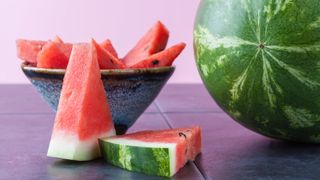On this Wikipedia the language links watermelon platter at the top of the page across from the article title. Taiwan 2009 Tainan City Organic Farm Watermelon FRD 7962. Cucurbitaceae family and the name of its edible fruit. Kordofan melons from Sudan are the closest relatives and may be progenitors of modern, cultivated watermelons.

Considerable breeding effort has developed disease-resistant varieties. Many cultivars are available that produce mature fruit within 100 days of planting. In 2017, China produced about two-thirds of the world’s total of watermelons. This section needs additional citations for verification. Please help improve this article by adding citations to reliable sources. The watermelon is an annual that has a prostrate or climbing habit. These usually have three lobes that are lobed or doubly lobed.
Young growth is densely woolly with yellowish-brown hairs which disappear as the plant ages. Like all but one species in the genus Citrullus, watermelon has branching tendrils. Western Australia where they are called “pig melon”. The sweet watermelon was first described by Carl Linnaeus in 1753 and given the name Cucurbita citrullus. Prior to 2015, the wild species closest to Citrullus lanatus was assumed to be the tendril-less melon Citrullus ecirrhosus Cogn. South African arid regions based on an erroneously identified 18th century specimen. Watermelons were originally cultivated for their high water content and were stored to be eaten during dry seasons, not only as a food source, but as a method of storing water.